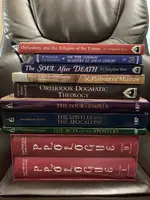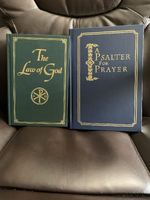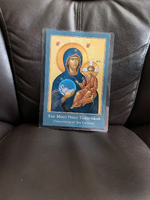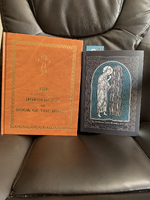You are using an out of date browser. It may not display this or other websites correctly.
You should upgrade or use an alternative browser.
You should upgrade or use an alternative browser.
Reading for Orthodox Catechumen & Inquirers
- Thread starter PaulC
- Start date
Of the Church Fathers I enjoyed Gregory of Nyssa's Life of Moses. It's a concise and eloquent biography of Moses followed by an edifying, spiritual interpretation of the events of his life.
Some memorable takeaways:
Moses saw God's back because to see Him is to follow him.
Any animal that touched Mt. Sinai had to be stoned because anything irrational and driven by passions can't approach God.
Joshua is another name for Jesus so it is him and not Moses who must lead Israel into the promised land.
Some memorable takeaways:
Moses saw God's back because to see Him is to follow him.
Any animal that touched Mt. Sinai had to be stoned because anything irrational and driven by passions can't approach God.
Joshua is another name for Jesus so it is him and not Moses who must lead Israel into the promised land.
Where in the world did you get a copy of the Prologue???I was perusing recommended book lists for inquirers and these seemed to make most lists. I already had the Orthodox Study Bible, Jordanville Prayer Book, and several of the intro to Orthodoxy type books (The Orthodox Church, The Orthodox Way, etc.). Any suggestions beyond these?
View attachment 171
I'm reading Spiritual Struggle by St. Paisios now. The simple clarity he speaks with is very refreshing. It is written in a question and answer format. It is essentially a compilation of his correspondence with an Abbess and nuns. Some of their exchanges are hilarious (mostly because you realize nuns really are just people too and struggle with the same mundane stuff). Yet even through that his advice remains clear and illuminating and cuts directly into the heart of the matter.I was perusing recommended book lists for inquirers and these seemed to make most lists. I already had the Orthodox Study Bible, Jordanville Prayer Book, and several of the intro to Orthodoxy type books (The Orthodox Church, The Orthodox Way, etc.). Any suggestions beyond these?
View attachment 171
A sample:
"In our times, one of the greatest illnesses is the vain thoughts of worldly people... They are tormented simply through not facing up to things in a spiritual manner. When we accept whatever happens to us with a good and positive thought, we are helped; while on the contrary; we are tormented and come apart at the seams when negative and evil thoughts prevail." -St. Paisios
Last edited:
Amazon.Where in the world did you get a copy of the Prologue???
Jeremiah Branch
Orthodox Catechumen
Jealous of your Prologue. lol.
A few other ideas:
Catechesis type books:
-- Hieromonk Gregorios, The Orthodox Faith, Worship and Life
Modern Lives of the Saints:
-- Precious Vessels of the Holy Spirit: The Lives and Counsels of the Contemporary Elders of Greece
-- Everyday Saints
-- Our Thoughts Determine Our Lives
Praxis:
-- The Way of the Pilgrim
-- The Struggle for Virtue (same author as your Bible commentaries)
Bible resources:
-- St. Theophan the Recluse, Thoughts for Each Day of the Year
-- The Bible and The Holy Fathers for Orthodox (pricey, but if you're splurging on the Prologue of Ohrid, you can buy this too.) (This has the daily readings according to the church calendar with commentary by the church fathers)
-- Grace for Grace: The Psalter and the Holy Fathers (same as above but for the Psalms)
As for Fr. Seraphim Rose, the best book to start with for inquirers, in my view, is God's Revelation to the Human Heart. Fr. Damascene Christensen's biography of Rose is also excellent. Both are available in free PDFs if you search a bit online.
A few other ideas:
Catechesis type books:
-- Hieromonk Gregorios, The Orthodox Faith, Worship and Life
Modern Lives of the Saints:
-- Precious Vessels of the Holy Spirit: The Lives and Counsels of the Contemporary Elders of Greece
-- Everyday Saints
-- Our Thoughts Determine Our Lives
Praxis:
-- The Way of the Pilgrim
-- The Struggle for Virtue (same author as your Bible commentaries)
Bible resources:
-- St. Theophan the Recluse, Thoughts for Each Day of the Year
-- The Bible and The Holy Fathers for Orthodox (pricey, but if you're splurging on the Prologue of Ohrid, you can buy this too.) (This has the daily readings according to the church calendar with commentary by the church fathers)
-- Grace for Grace: The Psalter and the Holy Fathers (same as above but for the Psalms)
As for Fr. Seraphim Rose, the best book to start with for inquirers, in my view, is God's Revelation to the Human Heart. Fr. Damascene Christensen's biography of Rose is also excellent. Both are available in free PDFs if you search a bit online.
Thanks for the reminder on The Bible and The Holy Fathers for Orthodoxy. I've been meaning to get another copy. I gifted mine to Roosh when I met him in 2019.Jealous of your Prologue. lol.
A few other ideas:
Catechesis type books:
-- Hieromonk Gregorios, The Orthodox Faith, Worship and Life
Modern Lives of the Saints:
-- Precious Vessels of the Holy Spirit: The Lives and Counsels of the Contemporary Elders of Greece
-- Everyday Saints
-- Our Thoughts Determine Our Lives
Praxis:
-- The Way of the Pilgrim
-- The Struggle for Virtue (same author as your Bible commentaries)
Bible resources:
-- St. Theophan the Recluse, Thoughts for Each Day of the Year
-- The Bible and The Holy Fathers for Orthodox (pricey, but if you're splurging on the Prologue of Ohrid, you can buy this too.) (This has the daily readings according to the church calendar with commentary by the church fathers)
-- Grace for Grace: The Psalter and the Holy Fathers (same as above but for the Psalms)
As for Fr. Seraphim Rose, the best book to start with for inquirers, in my view, is God's Revelation to the Human Heart. Fr. Damascene Christensen's biography of Rose is also excellent. Both are available in free PDFs if you search a bit online.
I'm a bit further behind on my journey 
I've just ordered the following:
The Orthodox Church: An Introduction to Eastern Christianity - Timothy Ware
Introducing Eastern Orthodox Theology - Andrew Louth
And... most importantly, a Holy Trinity Monastery Prayer Book
I also have an Orthodox study bible that I bought when I initally looked into it around the time of Covid. I wasn't then ready to accept Christ.
I've just ordered the following:
The Orthodox Church: An Introduction to Eastern Christianity - Timothy Ware
Introducing Eastern Orthodox Theology - Andrew Louth
And... most importantly, a Holy Trinity Monastery Prayer Book
I also have an Orthodox study bible that I bought when I initally looked into it around the time of Covid. I wasn't then ready to accept Christ.
Indication of the Way Into The Kingdom of Heaven by St. Innocent of Alaska is excellent. It's short book about how to be saved, and it's written in a powerful style. The main point:
1.) No one would be saved unless Jesus Christ had come.
2.) No one who believes in Jesus Christ but refuses to live as he lived will make it to heaven.
3.) Only the Holy Spirit enables men and women to live as Christ lived.
4.) God is inclined to give us the Holy Spirit when we turn from vice, read scripture, pray, and partake of the sacraments.
1.) No one would be saved unless Jesus Christ had come.
2.) No one who believes in Jesus Christ but refuses to live as he lived will make it to heaven.
3.) Only the Holy Spirit enables men and women to live as Christ lived.
4.) God is inclined to give us the Holy Spirit when we turn from vice, read scripture, pray, and partake of the sacraments.
I stopped by my OCA parish last week and spoke to the Father there, he lent me Introducing the Orthodox Church - Its Faith and Life by Anthony M. Coniaris.
So far it has resonated with me deeply.
So far it has resonated with me deeply.
The Gurus, the Young Man and Elder Paisios is a very readable book and will appeal to those previously caught up in eastern mysticism. It’s the story of a young man desperate for the truth, and his relationship with Saint Paisios, whose prayers protected him while he underwent a spiritually dangerous pilgrimage to India in a desire to see how the Hindu Gurus compare to Orthodox Monks.
Books like this are good for catechumens, imo, because the experiences recounted therein help remind us that there really is a spiritual realm. Materialism is so pervasive in the west, that even when we trust in the Church and have experienced the Grace and partaken of Christ’s Mysteries, it is still all too easy to unconsciously compartmentalise it, and forget that there really are evil spirits working to bring about our destruction and nothing is spiritually neutral.
In deeply Orthodox countries like Greece, materialism never took over, particularly among the common folk outside of cities. My own theory is that this is why the devil uses different deceptions over there, and why so many stories about the demonic and about sorcery seem alien to us or even provoke skepticism. Folk magic, witches, the evil eye, healers, fortune telling etc are more common in places that have a deep awareness of a spiritual world, even if practicing Orthodox Christianity has declined.
If the default system of belief is Orthodoxy, the devil can’t simply leave you alone.
Books like this are good for catechumens, imo, because the experiences recounted therein help remind us that there really is a spiritual realm. Materialism is so pervasive in the west, that even when we trust in the Church and have experienced the Grace and partaken of Christ’s Mysteries, it is still all too easy to unconsciously compartmentalise it, and forget that there really are evil spirits working to bring about our destruction and nothing is spiritually neutral.
In deeply Orthodox countries like Greece, materialism never took over, particularly among the common folk outside of cities. My own theory is that this is why the devil uses different deceptions over there, and why so many stories about the demonic and about sorcery seem alien to us or even provoke skepticism. Folk magic, witches, the evil eye, healers, fortune telling etc are more common in places that have a deep awareness of a spiritual world, even if practicing Orthodox Christianity has declined.
If the default system of belief is Orthodoxy, the devil can’t simply leave you alone.
Jeremiah Branch
Orthodox Catechumen
One resource I'll mention, even though it is not strictly speaking an Orthodox publication, is the Ancient Faith Study Bible. It is a Protestant Bible in terms of the scope of books included, and the translation, which is the (Holman) Christian Standard Bible (CSB). But the overall content of the Study Bible is exclusively commentary from the early Church Fathers. It includes only Church Fathers from the 1st through the 8th century, so it is pretty much by definition only those who would be part of Orthodoxy.
Apart from the commentary, there are articles on various theological topics, and the text of those articles are also taken directly from the writings of the Church Fathers. Then there are brief biographies of the Church Fathers who are quoted, some brief articles on various heresies, and also intermittent quotations taken from St. Augustine's Confessions.
All of the commentary is directly taken from the massive Ancient Christian Commentary on Scripture series edited by Thomas Oden. So this Bible is a nice and very economical way to get access to a pretty extensive selection of materials from that series.
As it is edited by Protestants, there was no doubt some bias in the selection of commentary, as well as some noticeable lacunae and silences on important passages. For instance, in the commentary on John chapter 6, they do not include any commentary that would support the idea of the real presence in the Mystery of the Eucharist etc. Something to keep in mind, but not a reason to avoid using this as a nice reference Bible.
Finally, a quick word about the translation itself. The CSB is a modern, conservative translation. It aims to be readable like the NIV, and not as hard-core literal / clunky as, say, the NASB. It's not one of my preferred translations, but it is superior to the NIV. The other interesting things about the CSB is that it is a totally new translation that did not piggy-back off of the KJV lineage as most translations have done (NKJV, Revised Standard Version, NRSV, etc etc.) So for those looking for a separate point of reference completely outside of the KJV lineage, this is not a bad Bible to refer to.
The Church Father commentary is what makes this Bible valuable, and it is very reasonably priced. For a non-Orthodox publication, it is very well done as far as trying to present only the early church teachings and writings.
Amazon product ASIN 1535940476
Apart from the commentary, there are articles on various theological topics, and the text of those articles are also taken directly from the writings of the Church Fathers. Then there are brief biographies of the Church Fathers who are quoted, some brief articles on various heresies, and also intermittent quotations taken from St. Augustine's Confessions.
All of the commentary is directly taken from the massive Ancient Christian Commentary on Scripture series edited by Thomas Oden. So this Bible is a nice and very economical way to get access to a pretty extensive selection of materials from that series.
As it is edited by Protestants, there was no doubt some bias in the selection of commentary, as well as some noticeable lacunae and silences on important passages. For instance, in the commentary on John chapter 6, they do not include any commentary that would support the idea of the real presence in the Mystery of the Eucharist etc. Something to keep in mind, but not a reason to avoid using this as a nice reference Bible.
Finally, a quick word about the translation itself. The CSB is a modern, conservative translation. It aims to be readable like the NIV, and not as hard-core literal / clunky as, say, the NASB. It's not one of my preferred translations, but it is superior to the NIV. The other interesting things about the CSB is that it is a totally new translation that did not piggy-back off of the KJV lineage as most translations have done (NKJV, Revised Standard Version, NRSV, etc etc.) So for those looking for a separate point of reference completely outside of the KJV lineage, this is not a bad Bible to refer to.
The Church Father commentary is what makes this Bible valuable, and it is very reasonably priced. For a non-Orthodox publication, it is very well done as far as trying to present only the early church teachings and writings.
Amazon product ASIN 1535940476
Before my baptism, I am certain that I learned the most through the prayers in my prayer book. Particularly the canons and akathists. There is a great deal of symbolism and profound truth in the hymns to our Lord and His Mother.
In addition to this Orthodoxy and the Religion of the Future gave me a compass by which to navigate the spiritual pitfalls of our time. Also the life of Saint Paisios the Athonite made a big impact on me.
In addition to this Orthodoxy and the Religion of the Future gave me a compass by which to navigate the spiritual pitfalls of our time. Also the life of Saint Paisios the Athonite made a big impact on me.
Orthodoxy and Religion of the Future is great especially if you come from a New Age background as I did. It opens your eyes to what's really going on behind the scenes in the world around us, and why we need to search for truth and not spiritual experience alone. A great contemporary follow-up is Orthodoxy and the Kingdom of Satan, though it's not a priority for inquirers.Before my baptism, I am certain that I learned the most through the prayers in my prayer book. Particularly the canons and akathists. There is a great deal of symbolism and profound truth in the hymns to our Lord and His Mother.
In addition to this Orthodoxy and the Religion of the Future gave me a compass by which to navigate the spiritual pitfalls of our time. Also the life of Saint Paisios the Athonite made a big impact on me.
Another one I really benefitted from is Beginning to Pray by Metropolitan Anthony Bloom. As the name suggests, it is intended to help you feel closer to God in your prayers.




